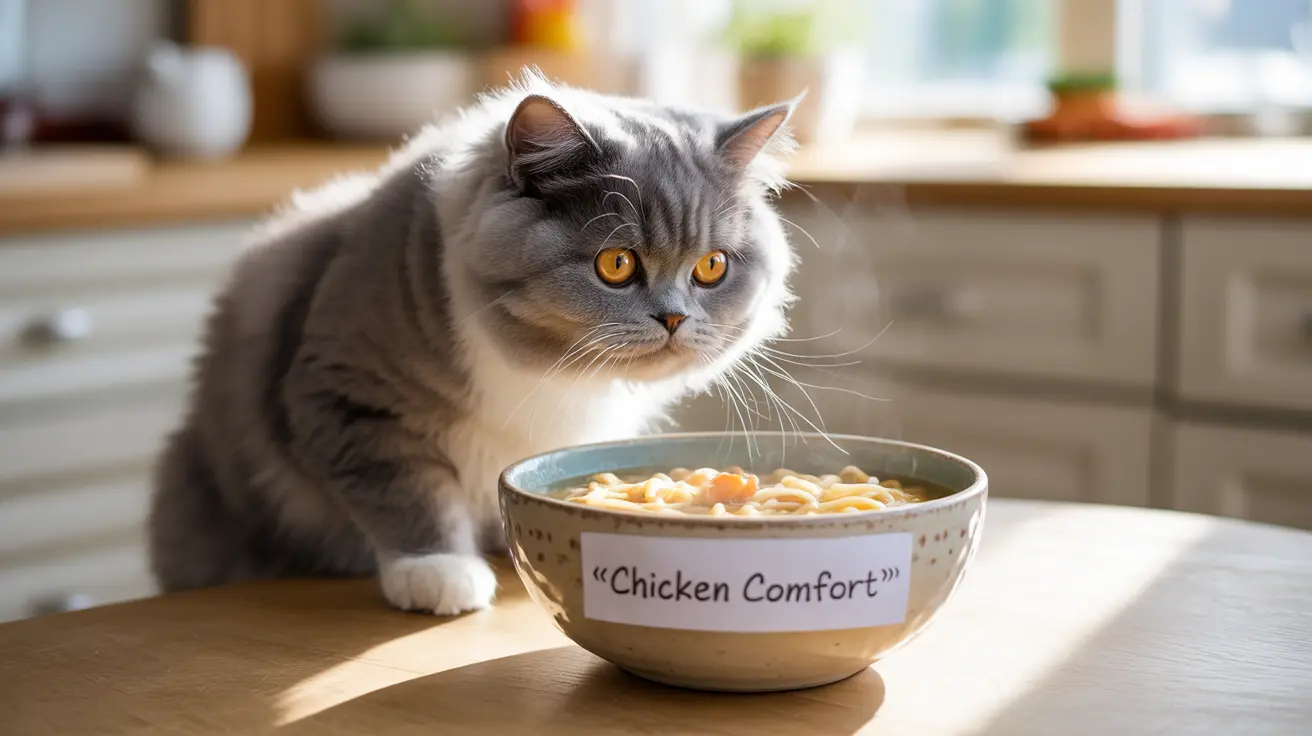When you're enjoying a warm bowl of chicken noodle soup, you might wonder if sharing this comfort food with your feline friend is safe. While cats may show interest in this human favorite, veterinary experts strongly advise against feeding chicken noodle soup to cats due to several serious health concerns.
Understanding why chicken noodle soup poses risks to cats is crucial for responsible pet ownership. This comprehensive guide will explore the dangers, potential health impacts, and safer alternatives for your feline companion.
Why Chicken Noodle Soup Is Dangerous for Cats
Commercial chicken noodle soup contains several ingredients that can be harmful or even toxic to cats. The primary concerns include:
High Sodium Content
Store-bought and restaurant soups typically contain excessive sodium levels that can be dangerous for cats. Even small amounts can lead to salt poisoning, causing dehydration, kidney stress, and severe electrolyte imbalances.
Toxic Ingredients
Many chicken noodle soup recipes include onions and garlic, which belong to the Allium family. These ingredients are highly toxic to cats, capable of causing life-threatening anemia by damaging red blood cells. Even trace amounts can be dangerous, with garlic being 3-5 times more toxic than onions.
Common Symptoms of Soup-Related Health Issues
Salt Poisoning Signs
- Excessive thirst and urination
- Vomiting and diarrhea
- Lethargy and weakness
- Tremors or seizures
- Decreased appetite
- Incoordination
Onion and Garlic Toxicity Symptoms
- Pale gums
- Weakness and lethargy
- Rapid breathing
- Loss of appetite
- Reddish urine
- Vomiting and diarrhea
Safe Alternatives for Cats
If you want to offer your cat a similar experience, consider these veterinarian-approved alternatives:
Homemade Cat-Safe Broth
Create a simple chicken broth specifically for your cat by:
- Boiling plain chicken in water
- Avoiding all seasonings, including salt
- Removing all bones and fat
- Letting it cool before serving
Commercial Pet Broths
Look for specially formulated pet bone broths that are:
- Free from onions and garlic
- Low in sodium
- Made specifically for pets
- Properly balanced for feline nutrition
What to Do If Your Cat Consumes Chicken Noodle Soup
If your cat accidentally ingests chicken noodle soup:
- Monitor them closely for any unusual symptoms
- Ensure fresh water is readily available
- Contact your veterinarian if concerning symptoms develop
- Keep detailed notes about the amount consumed and when
Frequently Asked Questions
Can cats safely eat chicken noodle soup or is it harmful to their health?
No, cats cannot safely eat chicken noodle soup. The combination of high sodium, toxic ingredients like onions and garlic, and unnecessary additives makes it harmful to feline health.
What are the risks of feeding my cat canned chicken noodle soup with onions and garlic?
Feeding cats canned chicken noodle soup with onions and garlic can cause severe anemia, gastrointestinal issues, and salt toxicity. Even small amounts of these ingredients can lead to serious health complications.
What symptoms should I watch for if my cat accidentally licks chicken noodle soup?
Monitor for vomiting, diarrhea, lethargy, excessive thirst, unusual urination patterns, and any changes in behavior. Contact your veterinarian if these symptoms appear.
Are there any safe homemade chicken soup alternatives I can give to my cat?
Yes, you can make a cat-safe broth by boiling plain chicken in water without any seasonings, onions, or garlic. Always let it cool before serving and offer in moderation.
Why is high sodium in chicken noodle soup dangerous for cats?
High sodium can cause severe dehydration, kidney problems, and dangerous electrolyte imbalances in cats. Their bodies are much more sensitive to sodium than humans, making even moderate amounts potentially harmful.
Remember, while chicken noodle soup might seem like a harmless treat, it's best to stick to veterinarian-approved foods and treats designed specifically for feline nutrition. Your cat's health and safety should always come first.






